- Home
- Jack Kerouac
The Town and the City: A Novel Page 7
The Town and the City: A Novel Read online
Page 7
“But you should always call anyhow. I have other plans sometimes.”
“It doesn’t matter, it doesn’t matter!” he hissed savagely through clenched teeth, and turned away to close his eyes and think. He suddenly knew that he had frightened her by this sudden show of pent-up anger, and whirled about to smile and say: “I’m sorry, I guess I should have called.”
She stared at him curiously.
A moment later he wandered after her towards the beach and the car. It was growing darker and the other boy had turned on the headlamps of the car while he dressed behind the open door.
“Come out of the water now,” called Mary to the children. “Cissy! Maggie!” She stamped her foot. “I’m gonna tell Ma on you if you don’t come out this minute.”
“Aw, you’re a scaredy-cat!” yelled the boy who was dressing. “Someday I’m gonna throw you right in the water and then you’ll learn how to swim!”
“No no no!” she squealed. “I’m afraid to drown, I’m afraid, honest!” and she bent over quickly to stifle a little delighted laugh.
Francis stared at her with amazement.
“Honest, Francis,” she went on, turning vivaciously with a toss of her head to him, “I’m afraid to death of drowning, ever since the Crouse boy drowned last summer. Oooh! you should have seen him when they dragged him out. I was there. My father found him. Oooh! I’m scared to death.”
“Then you mustn’t go swimming,” said Francis decisively, almost as though talking to himself.
For the next few minutes he was silent as he gazed at Mary, and listened to her talking to the children, watched her dry them off with a towel in a brisk and motherly way that sent pangs of unspeakable loneliness through his heart. “Mary, Mary,” he kept saying under his breath, framing the words with his lips in soft prayerful entreaty. He wanted to take her in his arms and walk away, carry her away, as far as he could go, till they came to some place where there were no people at all, and dark silence.
“Mary,” he said out loud, with a start.
She turned her dark gaze upon him.
“Come on with me, on the bicycle. We’ll go for a long ride.” And he put his hand on her shoulder very lightly, with tense fingers.
“Oh, we’re going for a ride on the highway for some ice cream, up at Bill’s,” she cried gleefully. “And potato chips too! They’re real good at Bill’s. Come on with us if you want.”
“If I had a car I’d take you to Bill’s every night,” he said softly.
“Oh, don’t be jealous, Francis; it’s not like you.”
“I’m not jealous,” he replied with a little sniff.
“Well, say something!” she cried suddenly.
“Huh? Well—I think I’ll go home, I think that’s what I’ll do now, go home.”
“If you want.”
“That’s what I want,” he said to himself out loud, fumbling with the bicycle and starting to turn miserably. At that instant Chuck having finished dressing and combing his hair on the beach, now appeared before them in the bright light of the headlamps. He shambled gracefully up to them with a proud lithe step over the sand, a big healthy good-natured athlete with an ingenuous grin and a handsome, offhand manner.
“Hi there, Martin!” he greeted. “Coming for the ride?”
“No, I’ve got to go some place.”
Chuck flicked the towel at Mary and whooped with laughter, yelling: “Well, come on, we ain’t gonna stay here all night! Come on, you kids, get in the car! Everybody get in!”
Mary went running into the car, calling back something to Francis which he never heard, and in a moment Chuck was racing the motor of the car.
Francis hurried away, pushing his bicycle along the path with a feeling of dry rotten horror in his heart.
The car was moving along the old dirt road, its headlights reaching over the bushes where he was walking, and in a moment he knew his wretched fleeing figure would be revealed in shafts of light for all to see. He suddenly threw himself on the ground with his bicycle and lay breathlessly embracing the grass in darkness.
He heard the car move slowly up the road, and Mary’s voice crying in the soft night: “Where’s Francis? I don’t see him anywhere! He just disappeared! Where is he?”
“Maybe he’s a six-day bike champ!” the football player shouted, and a moment later there were no sounds but that of the retreating car and the soft trilling of crickets all around.
Francis lay there on the grass for a long time, until he finally came to his senses, realizing that he was lying in the middle of the woods in the cricket-stirring night, under a vault of terrifying darkness. He looked around him on one knee with a wondering and crazy lonesomeness.
In the same half-demented state he stood up, got on the bicycle and started up along the path, turning into the road and cycling along with that feeling of crazed wonder. He couldn’t believe what had just happened; he tried to ignore it. “I’ll think about it later,” he said absentmindedly, and mused upon the countryside and the branches under which he glided swiftly.
Thus he picked up speed and came rolling along past the ramshackle old farmhouse where Mary lived, almost in high spirits now as he thought about what he would do tomorrow after school at home. But Mary’s two brothers were there smoking in the darkness of the porch steps.
“Hey, Frank!” they called. “Mary’s gone swimming by the railroad bridge. We just heard.”
“Did you find her, Frank?”
“Yes!” called Francis as he pedaled past them. “She’s swimming—And I hope she drowns!” he added in a choked cry they could not possibly have heard over that distance. And instantly the tears burned in his eyes, and he sped home weeping on his bicycle.
By the time he had arrived home, put up the bicycle and gone into his room, stamping around with the proud manly determination never to see her again and turning his thoughts to new matters, he suddenly couldn’t get over the thought that Mary had been searching for him while he lay hiding in the dark bushes.
He heard her say over and over again: “Where’s Francis? I don’t see him anywhere! Where’s Francis? where’s Francis? where’s Francis?”
So now young Francis was learning to weave himself into his own cocoon of tormented adolescence. All was harshness around him. He was biding his time and waiting with sad patience until life would open up for him as he desired it should. He was a musing, discontented, lonely young reader of books, of which there are so many in America scattered thinly and almost pathetically throughout the towns and cities: easy to hurt, open to abuse and scorn, much too sensitive in a thoughtful formal loneliness to withstand the harsh buffooneries, the horseplay, the animal brutality, the wild carelessness of a savage rhapsodic America in its shouting youthfulness. He was alone and fearful, and sometimes also scornful. He was different from the other kids his age who generally spent their time in ice cream parlors, on drugstore corners, on athletic fields, on dates at the movies and dancing. He was different from them and he was proud of it.
At seventeen, now, he may be walking home from the library at evening with a few books under his arm, or taking solitary walks at midnight, or sitting in his window reading after school, or drinking a coke at the corner drugstore in absorbed melancholy, but all the time he is balancing life and death, stumbling through a thousand moods of horror and hate, watching himself step discreetly through all the philosophies, sects, factions and cults of a hundred books, living the despondencies of many heroes—Jean Valjean, Prince Andrey Bolkonsky, Anna Karenina, Greta Garbo, Byron, Tristan, Hedda Gabler.
He goes to the library, and spends the morning poring reflectively through several biographies. Every now and then he looks up with an amused but rather sheepish smile. At noon, he lingers around Daley Square examining the townspeople of Galloway with secret pleasure and a feeling of aged understanding. Even when his father goes by among all the others, walking slowly to lunch in conversation with other businessmen in the rippling sunlight, he watches him secretly f
rom the doorway. Even then Francis is filled with a strange pleasure and the belief that he is the only mortal soul in the town who has frighteningly understood the meaning of life and death.
[8]
Young Peter Martin was busy trying to make the Galloway High School football team. It meant glory and triumph, and fame in Galloway, and little else was on his mind as he hurried home after dark each evening, late for supper, weary and absent-minded with all the hundred details of his goal. His mother would feed him great boiled dinners and he would eat them with a voracious abstracted intensity, mulling over his chances and ripping at the bread and meat at the same time, as though everything were part of one great hungry plan to succeed.
“How you making out on the team?” his father would ask him kiddingly, but in a goodnatured tone.
“We’ll see, we’ll see,” young Peter would reply grimly. “I might even get my uniform next week!”
He was fourteen when he first reported to the football practice sessions. He was growing but he had not grown enough. The coach and his assistants never gave one look at this boy who still seemed like a child, who was indeed a child, who was hardly grown enough to push a watercart around the field for any length of time. At the first day of practice, after going through routine calisthenics with everyone else, Peter collapsed on the grass and lay there sick for an hour trying to recover while all the others dashed around, jumped in the bus and went home all flushed with the excitement of the first day’s workout. Peter had then trudged home three miles, depressed by the very thought that he couldn’t even make it to the bus.
But he kept coming to practice, and later that season he was always seen standing around the edges of the squad on the field, attired in a pathetic nondescript football outfit that someone, probably the team manager, had happened to consign to him just because he had proved so obstinate coming to practice. Once in a while one of the assistant coaches would beckon him out to the middle of the field to stand there as a kind of defense dummy, around which the luminaries of the squad dashed and capered in all their recognized glory.
Still young Peter would stride back home at dusk, his mind teeming with the possibilities of his future as a football hero, hurrying into the house where his mother waited anxiously with his huge supper kept warm, and he would again tear into the meat and bread and consider the glorious triumphs that awaited him.
The following year, although he was only fifteen years old and still growing, he was already a junior in school and the better part of his high school days were spent.
“Don’t be discouraged, Petey,” his father would say to him, chuckling. “After all, you skipped grades in grammar school because you were such a smart little cuss and now you find yourself almost finished at high school. I don’t want you to feel bad, understand? It’s not your fault, you’re just a baby.”
“I’m not a baby—I’ll make the team this year!”
And that year he stood around on the edges of the practice field and watched, and waited for a chance to be beckoned out on the field to stand as a defense dummy, or to just be seen doing some impossible feat under circumstances which would suddenly, miraculously arise. He dreamed all day long in classrooms of some such circumstance: he saw himself being called out to play defense during an actual scrimmage by some stroke of luck that would take him only a minute to conjure up. He would spend hours brooding over what he would do: someone would throw a pass, destined for the great Bobby Stedman or for Mike Bernardi, the coaches would be standing around with impassive faces waiting for the play to materialize, the newspapermen would smile at one another saying, “There goes the old razzle-dazzle pass play!” Suddenly, out of nowhere, a swift stocky figure would blaze across their vision, leap up and intercept the pass, and come roaring down the field, at top speed, eluding all flailing arms, dodging and weaving and opening bursts of phenomenal speed that would simply astonish and amaze everyone present.
In his classes, at home while eating, in bed at night, and at the practice field during long sun-slanting October afternoons young Peter would lose himself in such reveries, and tremble at the very sight of Coach Reed whenever that venerable old mastermind would glance his way. Yet when practice came around he just stood there in back of the squad, lonesome, insignificant, shy, all decked out in another miserable hand-me-down of a football uniform, and tremble in his knees whenever a coach so much as looked his way, or one of the team’s stars brushed shoulders with him.
His father came to watch practice one day, and as the old man sat in the empty grandstands and saw his little son standing drooped and sad at the back of the squad, never so much as taking a step forward or doing any of the little capers that the other boys performed regularly as a means of catching the coach’s eye, he realized that Peter was not only too young and undersized for the brutal game of football but also too gentle and modest in his ways. No one would ever notice him on this or any other field.
He waved at his son and the boy smiled back shyly. George Martin went home shaking his head ruefully.
One day the coach was running the varsity team through a defense scrimmage and suddenly he was looking directly at Peter and several other young outcasts who spent every day faithfully standing around just as he did. Someone had just been injured and a replacement was needed in the fourth-string backfield that was scrimmaging on offense. It was a drowsy Monday afternoon, there were many absentees.
“Get one of those kids there to fill in!” the great coach barked. The assistant came over and scrutinized the kids with a sullen air. Several of the boys stepped forward eagerly, though with a little hesitation, while Peter stood back watching, almost blushing. It so happened, however, that Peter looked the least delicate of the lot—at fifteen he had begun to grow muscular bulges on his legs—and the assistant, staring with a dull expression of boredom, finally looked around the others and beckoned him over.
“You there! Step into the backfield. Get a helmet over there.”
Peter dashed to the sidelines and picked up a helmet with trembling fingers. The next moment he dropped the helmet to the ground, gulped, swallowed, and picked it up again. Someone had to help him put it on properly, as he stumbled wretchedly to the scene of the play.
“Hurry that kid up!” roared the great Coach Reed as he waited for the distraught scene to end, but Peter had suddenly discovered that one of his shoelaces was untied and there he was fumbling on one knee and looking up with a kind of despair.
Finally everything was set, and Peter found himself huddled among ten sweating grimy scrimmagers listening to the orders for the next brutal smashing play.
“You, kid,” barked the assistant coach in the huddle, “take out the end. That one there. Do you understand?”
“Yessir!” mumbled Peter. He was scared to death.
Explosively the play developed and Peter found himself rushing towards a tall rangy youth who came flailing straight at him. Peter lowered his helmeted head and pushed head-on, and just as he made contact he felt the explosive crash of bone and muscle encased in hard canvas, and fell to the ground momentarily stunned, feeling that all this had happened long ago in that precise dizzy way. He felt sickened and mortally afraid. The others returned to the huddle, Peter wandered after them in a daze, wondering why everything was so strange, staring around him incredulously.
“The same play!” barked the assistant coach. “Give those first-stringers a real workout!”
And Peter heard these words from far away.
Once more the center snapped the ball back and Peter realized that it was time again for him to rush the tall powerful player who had just smashed him to the ground with his pumping vicious knees. But all at once, in the flash of that moment, a surge of fear and lonely anger ran through him, he had a vision of retribution, he looked at the other boy and saw the gleam of dumb brutality in his eyes, he sensed something powerful and bloody between them and them alone. In the next instant, snarling and weeping and blind, Peter was running as fast as he coul
d and smashed straight into him, shoulders first.
The tall youth was cut down sharply.
“Nice block!” called the assistant coach.
The tall boy, whom Peter now more or less recognized as Al MacReady, the famous Galloway end, slapped Peter briskly on the back and said: “Nice, nice.”
Back in the huddle Peter glowed with the first triumph of his work: a sharp pain in his shoulder was dissolving quickly and seemed to be making his blood beat warmer. He danced nervously and champed the turf.
“Wait a minute,” said a quiet voice behind. Up stepped the venerable Coach Reed himself, staring over the field with eagle’s eye, musing, profound, big, approaching them with hands clasped behind in majestic authority. He leaned into the huddle and spoke to the panting youngsters in a deep gruff voice, his breath smelling of tobacco, wheezing softly with a sad asthmatic labor, a sadness that amazed Peter who had never stood so close to him. “We’ll try a switch here,” the old man growled. “And let this kid here carry the ball, on the eight end-sweep. What’s his name? What’s your name there?”
“Martin,” gulped Peter.
“You know the eight sweep?”
“Yessir.”
“All right! Go ahead.” And with this the old man backed up, hands clasped behind him, and waited for play to resume. “Be alert out there!” he called out to his regular players on defense. “Don’t let these kids pull one on you!”
At this the varsity players steeled themselves, champed, leaned forward eagerly, and waited for the play. One of these regular players was creating a sensation that year as a phenomenally savage tackler on plays breaking through beyond the line. He was a wiry powerful little Irishman named Red Magee who could come slicing into a play and send it scattering to four corners through sheer zest and wiry guts. Now, at the coach’s words, he danced and champed in vicious eagerness and waited for the play.
When Peter found the ball twirling back to him he was already running slightly forward, nervously, but once he had the ball in his hands he was off to the right in a wild sprint, literally running around his own blockers and finally sweeping wide around the end, around the tall Al MacReady who tottered reaching for him and fell, while all the others seemed to sway in Peter’s direction without actually getting underway. In a moment Peter was all alone running down the sidelines and looking back foolishly, as though he were just as embarrassed as the players. The coach blew his whistle to call the play back, but at that instant Red Magee came with the speed of a bullet upon Peter, who had stopped running, and smashed full force into him, cutting him down with a sudden sharp thud as the ball wobbled up into the air and the two boys scattered over the buckets on the sidelines. Peter saw stars.

 Tristessa
Tristessa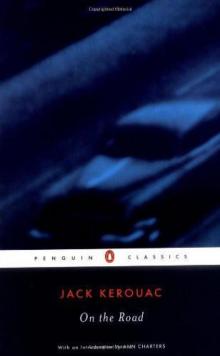 On the Road
On the Road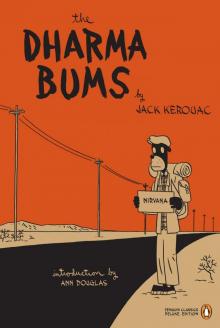 The Dharma Bums
The Dharma Bums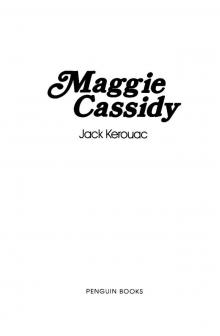 Maggie Cassidy
Maggie Cassidy Big Sur
Big Sur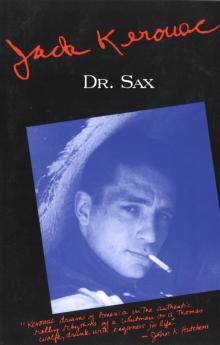 Dr. Sax
Dr. Sax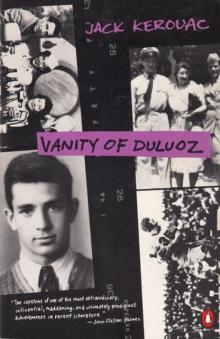 Vanity of Duluoz: An Adventurous Education, 1935-46
Vanity of Duluoz: An Adventurous Education, 1935-46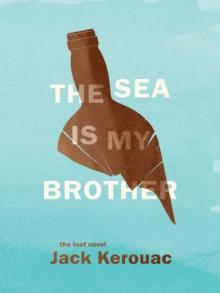 The Sea Is My Brother
The Sea Is My Brother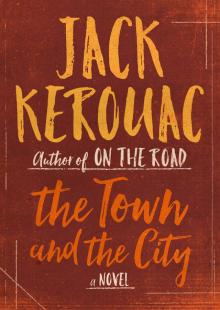 The Town and the City: A Novel
The Town and the City: A Novel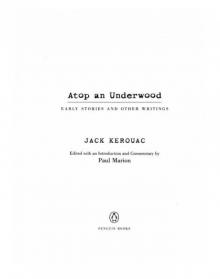 Atop an Underwood: Early Stories and Other Writings
Atop an Underwood: Early Stories and Other Writings Desolation Angels: A Novel
Desolation Angels: A Novel Book of Sketches
Book of Sketches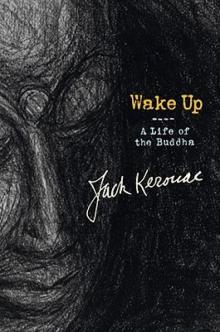 Wake Up: A Life of the Buddha
Wake Up: A Life of the Buddha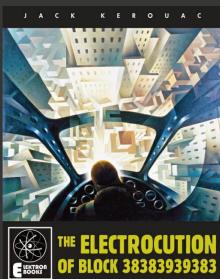 The Electrocution of Block 38383939383
The Electrocution of Block 38383939383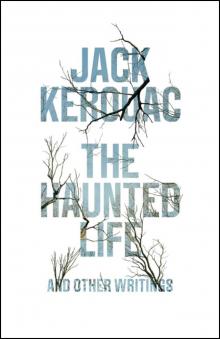 Haunted Life
Haunted Life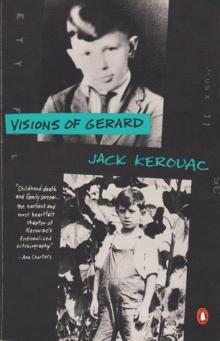 Visions of Gerard
Visions of Gerard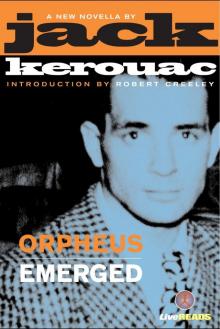 Orpheus Emerged
Orpheus Emerged Book of Blues
Book of Blues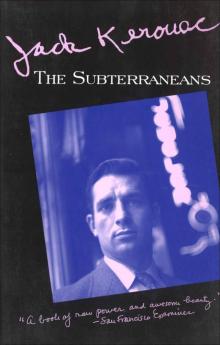 The Subterraneans
The Subterraneans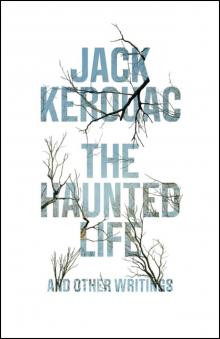 The Haunted Life
The Haunted Life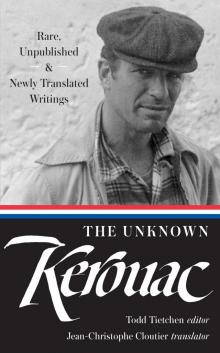 The Unknown Kerouac
The Unknown Kerouac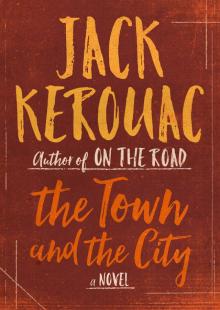 The Town and the City
The Town and the City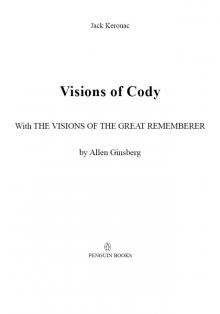 Visions of Cody
Visions of Cody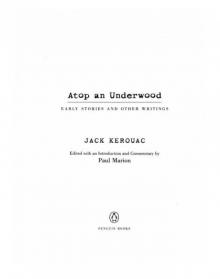 Atop an Underwood
Atop an Underwood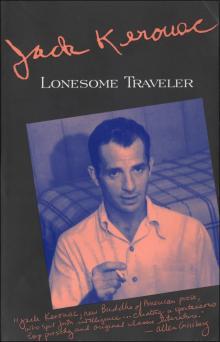 Lonesome Traveler
Lonesome Traveler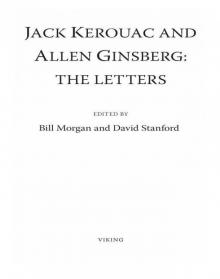 Jack Kerouac and Allen Ginsberg
Jack Kerouac and Allen Ginsberg Vanity of Duluoz
Vanity of Duluoz Desolation Angels
Desolation Angels On the Road: The Original Scroll: (Penguin Classics Deluxe Edition)
On the Road: The Original Scroll: (Penguin Classics Deluxe Edition)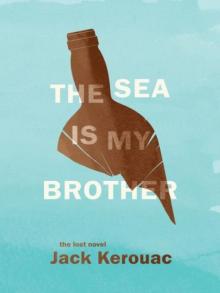 The Sea Is My Brother: The Lost Novel
The Sea Is My Brother: The Lost Novel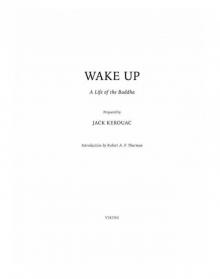 Wake Up
Wake Up The Poetry of Jack Kerouac
The Poetry of Jack Kerouac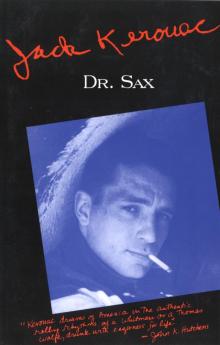 Doctor Sax
Doctor Sax